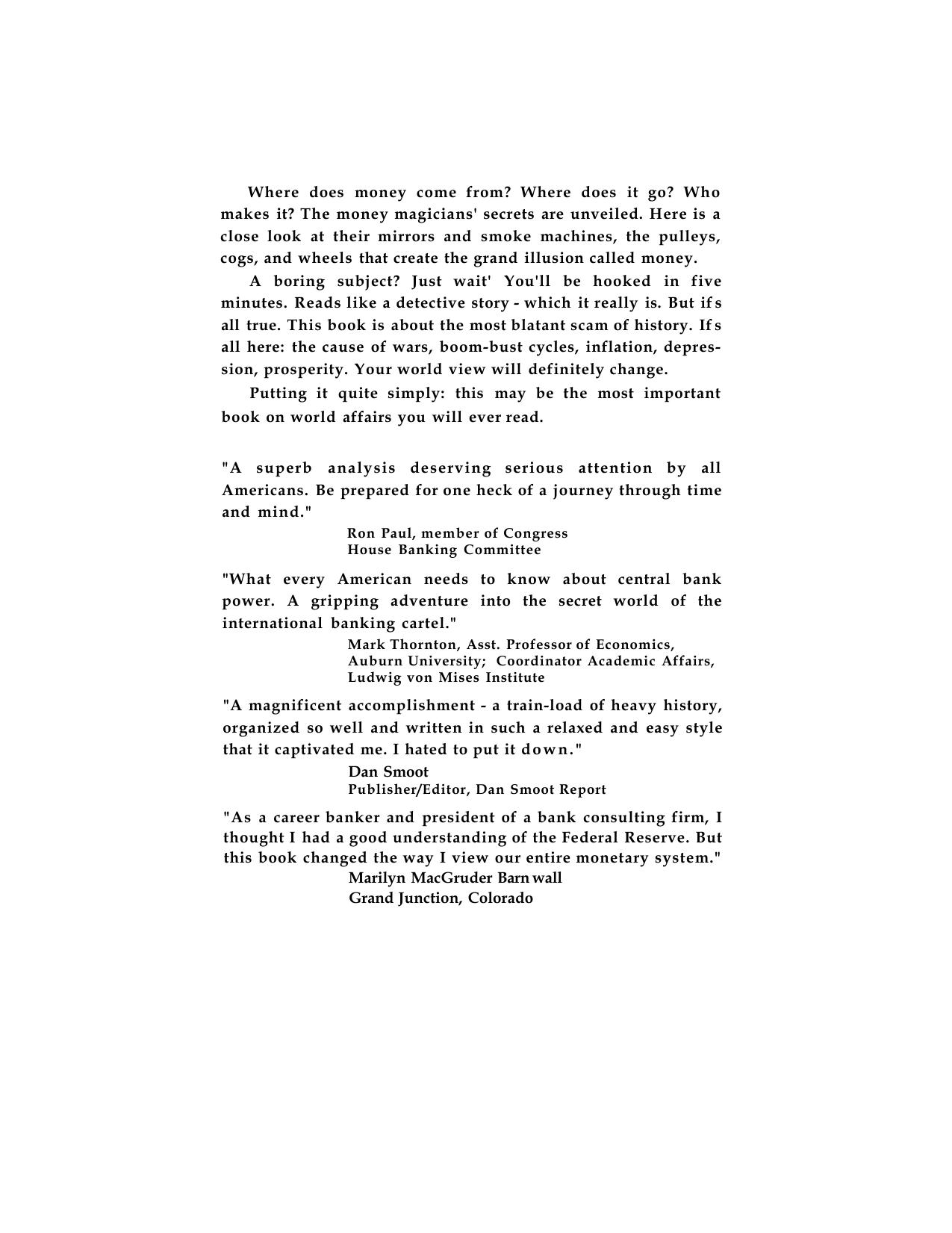The Creature From Jekyll Island: A Second Look at the Federal Reserve by G. Edward Griffin

Author:G. Edward Griffin
Language: eng
Format: mobi, epub, azw3, pdf
Tags: Business, Capitalists and Financiers, Banks and Banking, Economic Policy, Monetary Policy, Money & Monetary Policy, Political Science, Biography & Autobiography, Public Policy, Banks & Banking, Business & Economics, Federal Reserve Banks
ISBN: 9780912986456
Publisher: American Media
Published: 2010-11-30T22:38:50+00:00
Chapter Fifteen
THE LOST
TREASURE MAP
The bitter experience of the American colonies
with fiat money; the resolve of the founding
fathers to prohibit the new nation from resorting
to paper money without backing; the drafting of
the Constitution to that end; the creation of a true
American dollar; the prosperity that followed.
In the golden days of radio, on the Edgar Bergen Show, the
ventriloquist would ask his dummy, Mortimer Snerd, "How can
you be so stupid?" And the answer was always the same. After a
moment of deep thought on the part of Mortimer, he would drawl
his reply, "Well, it ain't easy!"
When we look at the monetary chaos around us today—the
evaporating value of the dollar and the collapsing financial institu-
tions—we are compelled to ask: How did we get into this fix? And,
unfortunately, Mortimer's response would be quite appropriate.
To find out how we got to where we are, it will be necessary to
know where we started, and a good place to begin that inquiry is
with the Constitution of the United States. Article I, Sections 8 and
10 say:
Congress shall have the power —
To borrow money ... to coin money, regulate the value thereof,
and of foreign coin, and fix the standard of weights and measures;...
[and] to provide for the punishment of counterfeiting....
No state shall ... coin money; emit bills of credit; [or] make
anything but gold and silver coin a tender in payment of debts.
The delegates were precise in their use of these words.
Congress was given the power to "coin money," not to print it.
Thomas M. Cooley's Principles of Constitutional Law explains that
'to coin money is to stamp pieces of metal for use as a medium of
exchange in commerce according to fixed standards of value."
• -
310 THE CREATURE FROM JEKYLL ISLAND
What was prohibited was to "emit bills of credit" which, according
to the speeches and writings of those who drafted the document,
meant the printing of paper IOUs which were intended to be
circulated as money—in other words, the printing of fiat money
not backed by gold or silver.
At first, it would seem that nothing could be more clear. Yet,
these two simple clauses have become the basis for literally
thousands of pages of conflicting interpretation. The crux of the
problem is that, while the Constitution clearly prohibits the states
from issuing fiat money, it does not specifically prevent the federal
government from doing so. That was truly an unfortunate over-
sight on the part of the document's framers, but they probably
never dreamed in their wildest nightmares that their descendants
"could be so stupid" as to not understand their intent.
Furthermore, "it ain't easy" to miss their intent. All one has to
do is look at the monetary history that led up to the Constitutional
Convention and to read the published letters and debates of the
men who affixed their signatures to that founding document.
As one reads through the debates on the floor of the conven-
tion, one is struck by the passion that these delegates held on the
subject of money. Every one of them could remember from his
personal experience the utter chaos in the colonies caused by the
issuance of fiat money. They spoke out against it in no uncertain
terms,
Download
The Creature From Jekyll Island: A Second Look at the Federal Reserve by G. Edward Griffin.epub
The Creature From Jekyll Island: A Second Look at the Federal Reserve by G. Edward Griffin.azw3
The Creature From Jekyll Island: A Second Look at the Federal Reserve by G. Edward Griffin.pdf
This site does not store any files on its server. We only index and link to content provided by other sites. Please contact the content providers to delete copyright contents if any and email us, we'll remove relevant links or contents immediately.
International Integration of the Brazilian Economy by Elias C. Grivoyannis(110458)
The Radium Girls by Kate Moore(12018)
Turbulence by E. J. Noyes(8040)
Nudge - Improving Decisions about Health, Wealth, and Happiness by Thaler Sunstein(7693)
The Black Swan by Nassim Nicholas Taleb(7110)
Rich Dad Poor Dad by Robert T. Kiyosaki(6613)
Pioneering Portfolio Management by David F. Swensen(6289)
Man-made Catastrophes and Risk Information Concealment by Dmitry Chernov & Didier Sornette(6007)
Zero to One by Peter Thiel(5789)
Secrecy World by Jake Bernstein(4741)
Millionaire: The Philanderer, Gambler, and Duelist Who Invented Modern Finance by Janet Gleeson(4469)
The Age of Surveillance Capitalism by Shoshana Zuboff(4279)
Skin in the Game by Nassim Nicholas Taleb(4239)
The Money Culture by Michael Lewis(4198)
Bullshit Jobs by David Graeber(4179)
Skin in the Game: Hidden Asymmetries in Daily Life by Nassim Nicholas Taleb(3992)
The Dhandho Investor by Mohnish Pabrai(3760)
The Wisdom of Finance by Mihir Desai(3735)
Blockchain Basics by Daniel Drescher(3574)
